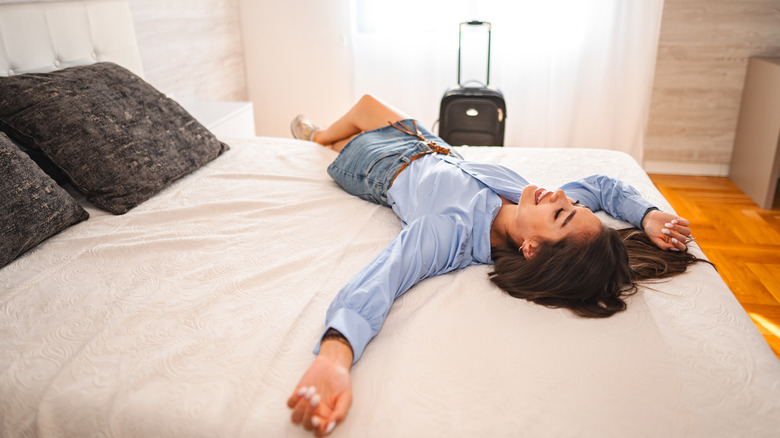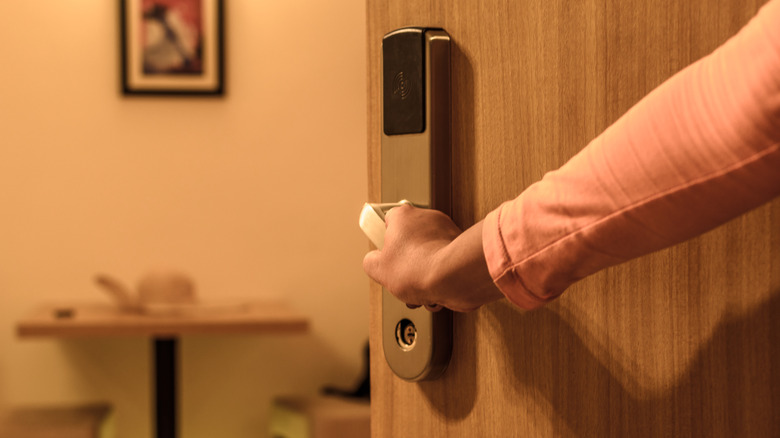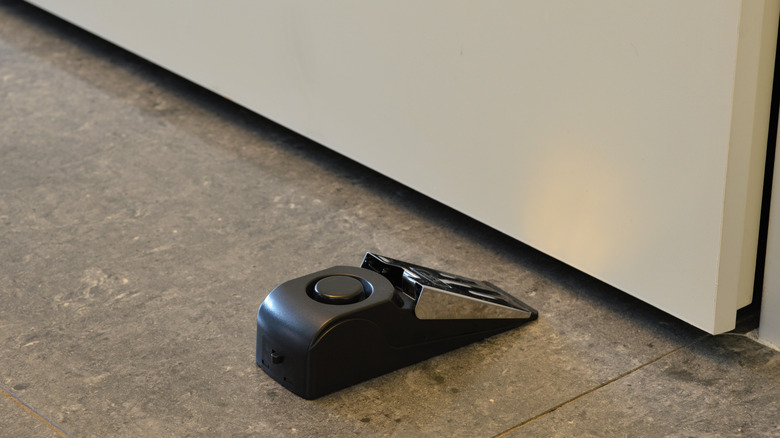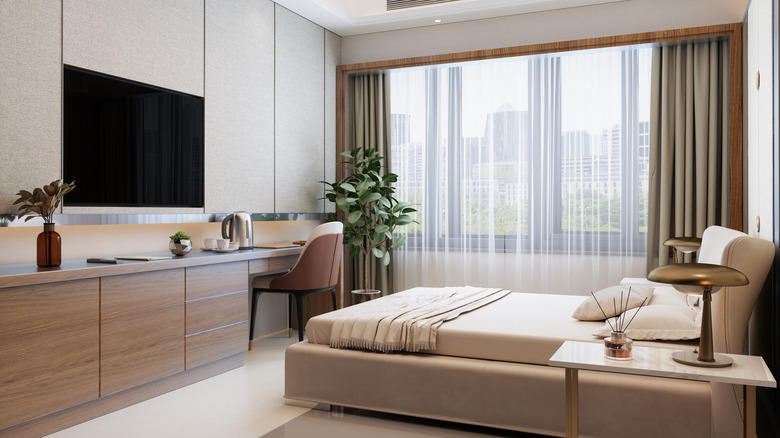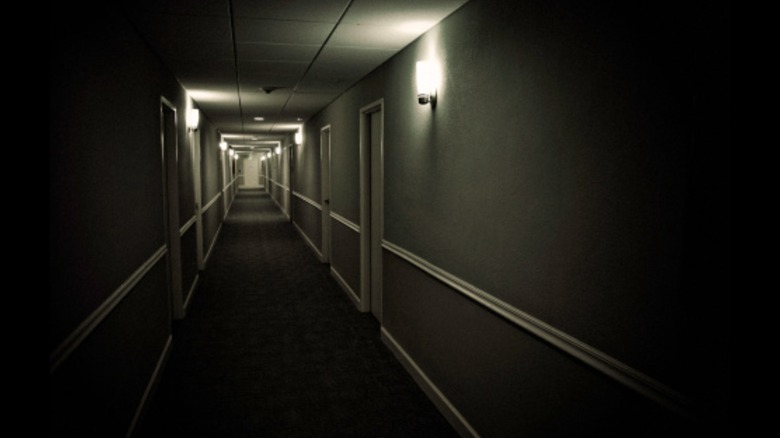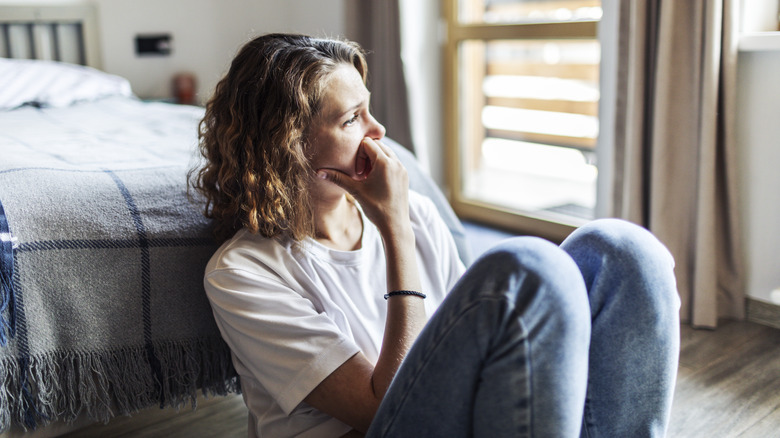Travel Safety Expert's Best Tips To Feel As Secure As Possible During Your Hotel Stay
Hotel rooms can feel like heaven, especially for a world-weary traveler. After all, there's not much better than snuggling up in a fresh comforter in a giant bed . But sometimes, you have to remember that not all hotel rooms are created equal — or safe. That's why we turned to expert Joanne McNellis, founder and CEO of Travel Safety Solutions. She gave us all kinds of advice for how to feel safe in hotel rooms, from what to bring to what to look out for.
Most of all, McNellis advised trusting hotel staff when navigating a new-to-you place, though you can also do your own research. "Review the area in which your hotel is located to get a feel for the surrounding neighborhood," McNellis told Islands exclusively. "Ask the front desk about the areas surrounding the hotel that you should avoid. They will know best!" Before you stay in your next hotel room, ensure you have McNellis' advice on hand so you can maintain your peace of mind.
Complete a safety check and make your hotel room appear occupied
Feeling safe in your hotel room starts the second you open the door. That's because you should conduct a short safety check of the room before you move right in. Safety expert Joanne McNellis advised that you should perform this check with the door slightly ajar, held open by your luggage as you look around.
"Check the bathroom, closets, and behind curtains to ensure no one is hiding in the room," she explained. "Also, if your room has a connecting door, you will want to make sure the lock is operational and always kept locked." McNellis also recommended always turning the TV on and placing the do not disturb sign on the door when you leave the room to give people the impression that someone is inside. Choose a TV volume that won't disturb other guests but is loud enough to hear through the door. Doing this can alleviate the concern that people know you're out for the day.
Secure your hotel room with easy-to-pack security devices
Beyond the steps you can take to check for strangers hiding in your hotel room, you can bring along handy security devices. These items take up little space in your luggage but can alleviate a lot of your safety anxieties during your travels. "Carrying a doorstop with an alarm to slip under the entry door, along with a portable lock, are items that provide additional safety and accompany me everywhere," Joanne McNellis explained.
Additionally, McNellis suggested purchasing a hidden camera detector, which can help identify any unwanted surveillance without requiring a lot of extra searching on your part. These detectors can pinpoint any hidden cameras disguised as otherwise normal objects like charging ports, socket face plates, and even lightbulbs. Save yourself the time and get a detector so you don't have to search high and low in a hotel room.
Request a room between the second and sixth floors
Some hotel rooms might have primo views, though they may come at some cost to your safety. Joanne McNellis explained that some hotel room locations are safer than others — particularly if they have sky-high views. "While many of us love a great view, rooms above the sixth floor can be a bit more hazardous, as fire ladders in most countries do not extend beyond the sixth or seventh floors," she said.
Yet, travelers should be wary of low-level rooms as well, particularly ground or first-floor locations, McNellis added. She suggested asking the front desk if you can switch rooms if they place you in a spot on the first floor. She advised approaching this location with caution, especially if your room has outside-facing doors such as a patio. Further, our expert suggested requesting a room near an emergency exit. Approaching your room with these ideas in mind could put you more at ease wherever you are in the world, even the safest Caribbean islands.
Look for safety red flags at the hotel
If you get to your hotel room and discover the door has a broken lock, that's an obvious red flag. The same goes for seeing a ton of bed bugs skittering around in your sheets. But there are a handful of potentially less obvious red flags you should be aware of when visiting a hotel — particularly if you head to areas like the most dangerous Caribbean destinations. Joanne McNellis identified some of these warning signs, like a lack of security personnel or broken security cameras.
"A property with an unattended or poorly lit lobby is a huge red flag for me," McNellis explained. "The absence allows unauthorized people to roam around the hotel and gain access to all floors ... Poorly lit parking lots can also create opportunities for criminal behavior. If you park your vehicle in the lot and do not feel comfortable retrieving your car, ask a hotel staff member to walk you to your car."
To McNellis' last point, even if a hotel parking lot is well-lit, there are ways you can further protect yourself and your property. You should try to park under or as close to a light as possible to deter unwanted attention from criminals who want to stay in the shadow.
Don't ignore your intuition
You can do everything in your power to feel safe in your hotel room: performing all the checks, bringing an extra door lock, and requesting the best location for optimal safety. However, your intuition may still tell you the hotel is not a good place to be. Joanne McNellis urged that you shouldn't dismiss that feeling.
"Trust your gut instinct!" McNellis said. "If, when you check into a property, you are not comfortable with its surroundings, or something just feels off, find an alternate property. I have done this several times and have never regretted my choice. I would rather absorb a cancellation fee than stay somewhere that I don't feel safe."
There is only so much you can do to protect yourself while on a trip. You can help protect yourself physically and financially when situations out of your control arise by learning about your travel insurance options.
